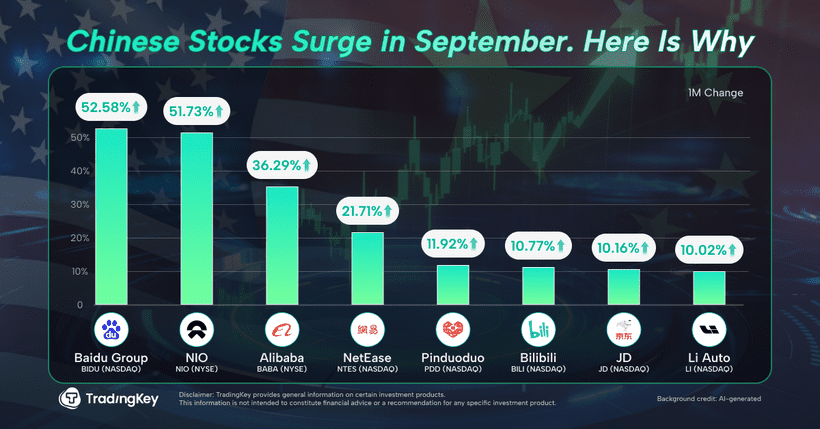Chinese Stocks Surge in September. Here Is Why
-cccdb2d197854910aea8da91a396633f.png)
TradingKey - Chinese stocks listed in the U.S. had a great day on Wednesday. The Nasdaq Golden Dragon China Index jumped nearly 3%, with Baidu surging over 11% and Alibaba climbing more than 2% — helping to drive the rally across the board.
Better Signs from U.S.-China Talks
Things are finally looking up on the geopolitics front. After high-level talks in Madrid, Washington and Beijing seem to have reached a basic understanding around the TikTok issue. That’s already a huge sentiment boost.
Then came more good news: U.S. President Donald Trump announced another delay on enforcing the TikTok ban — now pushed back three more months to December 16. That buys time for further negotiation and signals political will to deescalate, at least for now.
What’s more, Trump confirmed he'll be speaking with China’s leader this Friday. Treasury Secretary Bensent said any decision on a formal summit will come out of that call. There’s growing speculation that the result might be a high-profile "Trump state visit" to China — which would likely exceed most market expectations and signal a meaningful thaw in the relationship
AI Catalysts Dominate
AI has quickly become the driving force behind revaluations in Chinese tech stocks. According to The Information, Alibaba and Baidu have started using their own AI chips to power some training tasks for their models. That’s a key step in reducing reliance on U.S. chipmaker NVIDIA — even though both still use NVIDIA chips for their most advanced models.
On the execution front, Baidu’s autonomous taxi unit, Apollo Go (“萝卜快跑”), is seeing serious traction. In Q2 2025, ride volume surged 148% year-over-year to 2.2 million rides. Baidu is now working with Uber and Lyft to expand overseas, with service in 16 cities. In terms of safety miles, it’s catching up fast with Waymo — a sign its tech might finally be ready for prime time.
A Morgan Stanley report now estimates Baidu’s AI-related revenue accounts for over 30% of its business, and projects it could surpass RMB 50 billion by 2025. In short, AI is now a real engine for growth — not just a buzzword.
Alibaba is making moves too. In September, it rolled out a new AI architecture called Qwen3-Next. The new model is said to be 10x more efficient than the previous version while costing just a tenth to build. Goldman Sachs says Alibaba is strongly positioned for long-term leadership in AI — citing its 47% market share in China’s public cloud, deep model-building experience, and diversified chip access. All of that adds up to serious international expansion potential.
Global Investors to Chase Chinese Innovation
Money is starting to flow back into Chinese equities. A new study from Morgan Stanley shows that August was the biggest month in six months for global hedge fund buying of Chinese stocks.

Jerry Wu, fund manager at London-based Polar Capital (which oversees $20B in assets), says breakthroughs like DeepSeek — a more cost-efficient competitor to ChatGPT — have reignited interest in China's innovation ecosystem. From biotech and robotics to next-gen AI, momentum is building across multiple strategic sectors.
And now we’re finally seeing that reflected in actual capital flows and stronger valuations
U.S. Tech Cools Down
While Chinese tech names rallied, American tech giants took a step back. The “Magnificent Seven” index slipped 0.66%, snapping a four-day winning streak. Analysts say that strong rate-cut expectations had already pushed U.S. equities, especially tech, to all-time highs — so some cooling off was overdue.
Rising bond yields didn’t help either. After last week’s Fed meeting, Treasury yields briefly dipped but then spiked as Fed Chair Jerome Powell doubled down on a data-dependent stance. By day’s end, the 10-year Treasury yield was up 6.3 basis points, while the 2-year yield rose 5.62 basis points.
Tech stocks are more sensitive to interest rates than most. That’s because their valuations rely heavily on future cash flow — and higher yields mean those cash flows are worth less today. In other word, Higher rates mean valuation pressure for tech stocks .








